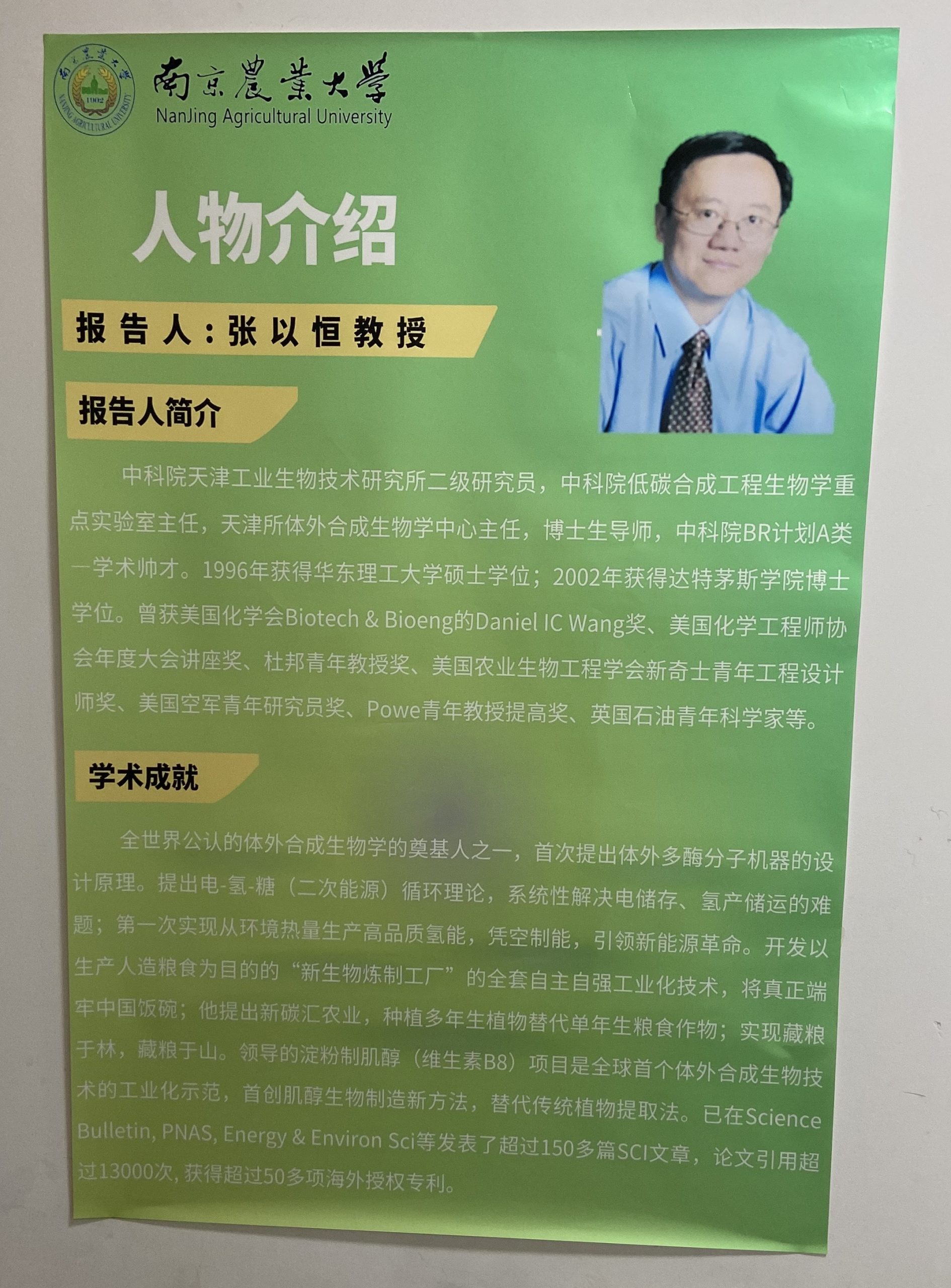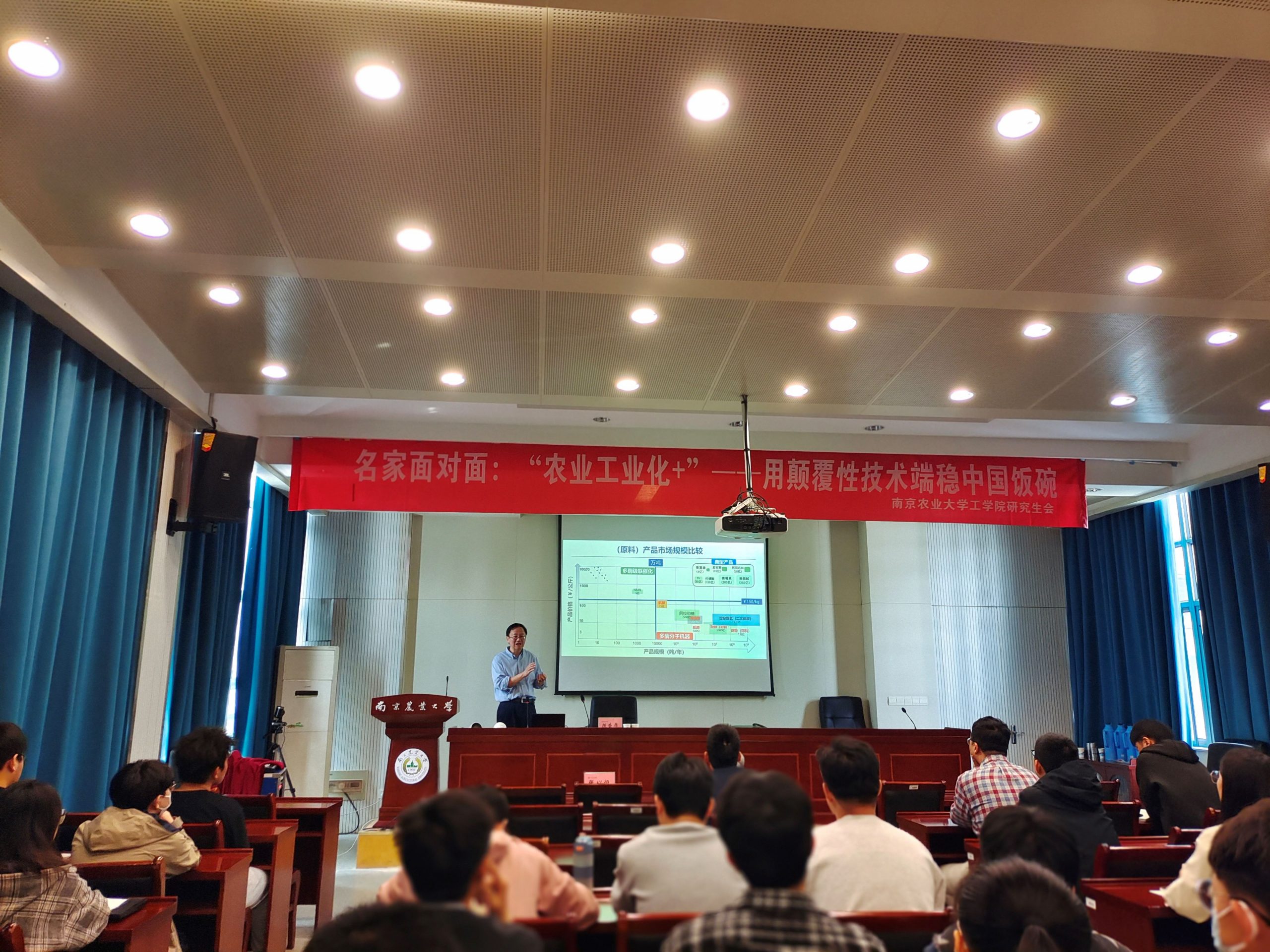纤维素淀粉Stabilization of Global and Chinese rice bowl with disruptive technology
Stabilization of Global and Chinese rice bowl with disruptive technology
As invited by Prof. Zhen Fang, on April 15th,Prof. Yi-hang Zhang, Director of the Center for in Vitro Synthetic Biology of Tianjin Institute of Industrial Biotechnology, Chinese Academy of Sciences (CAS), gave an academic lecture at 10 am in C502 conference room of Yixian Building, with the theme of “Agricultural Industrialization+”: Stabilization of global rice bowl with disruptive technology.
Prof. Zhen Fang welcomed the arrival of Prof. Zhang and briefly introduced Prof. Zhang.
Prof. Zhang thanked Prof. Zhen Fang’s invitation to give a lecture on the “two paths and one goal” (straw to starch production and CO2 production of food for the goal of the strategic needs of national food security) as well as reaching the national carbon goals, guaranteeing people’s health and maintaining rural revitalization to meet the UN sustainable development goals (SDGs). Professor Zhang said that it is necessary to lead the development of a full set of independent and self-improvement new biological refining technologies for producing starch, protein and healthy sugars from straw, the main components of artificial food, and developing straw grain synthesis technologies that are economic viable in 3-5 years. In addition, Professor Zhang also showed that innovative energy-driven material synthesis models will solve the problem of low energy efficiency and slow conversion rate of natural photosynthesis, and it is expected that CO2 production of artificial food could be industrialized in 2036.
Professor Yi-Heng Zhang Bio, Bachelor and Master degrees in Bioengineering, East China University of Science and Technology, Ph.D. in Chemical Engineering, Dartmouth. Professor (level 2) of Tianjin Institute of Industrial Biotechnology, CAS. He is director of the National Key Laboratory of Low-carbon Synthetic Engineering Biology, director of the Center for in Vitro Synthetic Biology of Tianjin Institute, doctoral supervisor. He is “One Hundred Program Scholar” (class A) of CAS, one of the world’s most-recognized pioneers in vitro synthetic biology who proposed the design principle of in vitro multi-enzyme molecular machines for the first time. He developed the electricity-hydrogen-sugar (secondary energy) cycle theory that systematically solves the problems of electricity storage, hydrogen production, storage and transportation, and realizes the production of high-quality hydrogen energy at ambient conditions for the first time. He developed a full set of independent self-reliant industrialization technologies for the “new biorefinery plant” for producing artificial food, and led the starch-to-inositol (vitamin B8) project, the world’s first industrial demonstration of in vitro synthetic biotechnology, and pioneered a new method for inositol biomanufacturing.


秸秆直接酶转化为淀粉、蛋白和健康糖等人造粮食
2023年4月15日,应方真教授邀请,中科院天津工业生物技术所体外合成生物学中心主任张以恒教授于上午10点在育贤楼C502会议室为生物能源组和研究生做学术讲座,主题为“农业工业化+”:用颠覆性技术端稳中国饭碗为主题。
方真教授对张以恒教授的到来表示欢迎并简要介绍了张以恒教授。
张以恒教授感谢方真教授的邀请,围绕“两个路径一个目标”展开演讲,两个路径指秸秆制粮和CO2生产粮食,一个目标满足国家粮食安全、双碳目标、关注人民健康和乡村振兴的战略需求。张以恒教授表示,要领导发展全套自主自强新生物炼制技术-秸秆直接酶转化为淀粉、蛋白和健康糖等人造粮食,在3-5年内开发用得上、用得起、用的好的秸秆制粮技术。并且,张以恒教授还表明,将创新能量驱动物质合成模式,解决自然光合作用能量效率低、转换速度慢的问题,预计在2036年将CO2生产粮食产业化。
张以恒教授, 华东理工大学生物工程学士和硕士、美国达特茅斯学院化学工程博士。中科院天津工业生物技术研究所二级研究员,低碳合成工程生物学全国重点实验室主任,天津所体外合成生物学中心主任,博士生导师,中科院百人计划A类—学术帅才,全世界公认的体外合成生物学奠基人之一,首次提出体外多酶分子机器设计原理。他提出的电-氢-糖(二次能源)循环理论系统性解决电储存、氢产储运的难题,第一次实现从环境热量生产高品质氢能。他开发以生产人造粮食为目的的“新生物炼制工厂”的全套自主自强工业化技术,所领导的淀粉制肌醇(维生素B8)项目是全球首个体外合成生物技术的工业化示范,首创肌醇生物制造新方法。